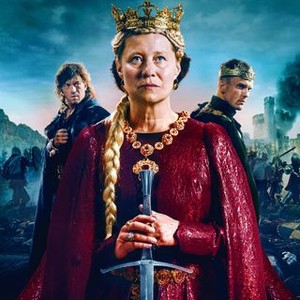Someone is out to get us. But they do not know who they are up against.~ Queen Margrete I in Margrete: Queen of the North (2021)
On July 20, 1396, the feast of the virgin-martyr St. Margaret of Antioch, Queen Margrete I of Denmark, known to her people as the "Lady King," published the Union of Kalmar, uniting the three kingdoms of Denmark, Sweden and Norway under one crown. A year later she crowned her adopted son Eric of Pomerania as Sovereign of the Three Kingdoms, although Margrete remained in control. What followed was more than a century of peace within Scandinavia, leading to an era of great prosperity. Margrete insisted on law and order, punishing rape severely, while encouraging the growth of the Order of Brigettines (she had grown up with St. Bridget of Sweden's daughter and granddaughter.) Her highly successful reign, however, was marred by a bizarre incident in which a stranger showed up at court claiming to be her only son King Olaf, who had died of the plague at the age of seventeen many years before. The pretender was judged to be a fraud and executed for treason.
Margrete: Queen of the North dramatizes the episode of the "false Olaf" in a film of poignant magnificence. Sets, costumes, and stormy vistas are perfection and a treat for lovers of things medieval. I saw the dubbed version but would have preferred the original since I would rather hear the actors' own voices, although the dubbing did not ruin it for me. Danish actress Trine Dyrholm as the Lady King captures the turmoil that assails the usually imperturbable monarch as she struggles with the realization that the hapless, broken man might truly be her son. She eventually becomes convinced that Olaf did not die as a teenager but was hidden by her enemies to be brought to light at the very moment when his presence can destroy the fragile peace she has so laboriously wrought. Nevertheless, even as her emotions overwhelm her, Margrete seeks the guidance of Bishop Peder, a longtime mentor. She sends trusted messengers into Prussia to discover if her old foes the Teutonic knights are playing a part in the reappearance of Olaf.
While Queen Margrete wrestles with herself and seeks to discover the truth, her chosen heir Eric is scheming behind her back. Eric is about to become betrothed to the child princess Philippa of Lancaster, daughter of the usurper Henry IV, but the English ambassador is demanding more than Queen Margrete wants to give. Eric tries to negotiate on his own but is out of his league due to youth and inexperience. He ends up being humiliated by Margrete. As the bitter truth dawns, the Lady King has to choose between her two sons, Eric, whom she has adopted and brought up to be king, and Olaf, who is her biological son but whose ascendancy could destroy the promising future of the Scandinavian peoples.
From The Guardian:
Blending the grand visuals of a sweeping epic with the psychological unease of a chamber piece, Charlotte Sieling’s feature probes the legacy of Denmark’s Queen Margrete, a visionary ruler who brokered the historic Kalmar Union that – for the first time – united Norway, Sweden and Denmark against the threat of a German invasion. But her reign also saw a bizarre mystery in the Scandinavian region, which forms the emotional beating heart of this stately film. On the eve of the engagement between Margrete’s adopted son Erik (Morten Hee Andersen), and Princess Philippa (Diana Martinová), daughter of England’s Henry IV, news broke that the Queen’s biological son King Olaf (Jakob Oftebro) had returned from the dead. This sudden arrival not only unsettled political coalitions but also sent the usually stoic Margrete into a state of distress. Since she was not at his side when Olaf died, her maternal grief encouraged her to believe that Olaf had survived. On the other hand, her monarchical rationality questioned if he was merely an impostor sent to her doorsteps to disrupt a sought-after alliance with England. Much of this emotional tug-of-war is played out in atmospherically lit indoor compositions, which evoke a painterly, classical feel. What elevates the film from a run-of-the-mill period drama is Trine Dyrholm’s masterfully understated performance as the tormented queen. Her Margrete has no need to shout and weep to convey her turmoil; a mere gaze is enough to articulate the dilemma of having to put collective needs over personal desires. (Read more.)
Margrete is a noble character, a virtuous lady who seeks the common good in the framework of her vocation as a Christian monarch. While there obviously is love between her and Peder, it is restrained and subdued by duty. In the end, Margrete must make an unspeakable sacrifice, which the viewer realizes is the greatest in a series of sacrifices which have composed her life. How appropriate is the back drop of the majestic crucifixion altar piece in the chapel scenes, a carved and colorful work of art depicting Our Lady standing at the foot of the cross. For Queen Margrete is compelled to live out her own passion play and in this the actress is able to convey boundless sorrow without speaking a word. Once again we are taught that the privileges that come with wearing a crown are nothing compared to the sacrifices which honorable rulers must make.




















No comments:
Post a Comment